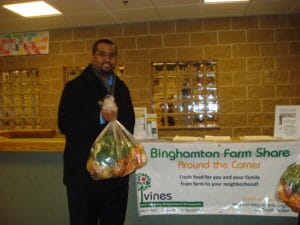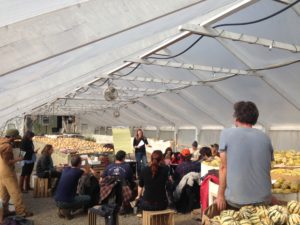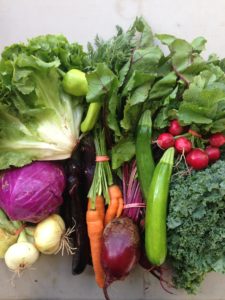Binghamton Farm Share: Supporting Local Farms and Communities
April 4, 2016/
by Kate Miller-Corcoran
Community Supported Agriculture or CSAs are important in connecting consumers to farmers. CSA members invest in a farm for an entire season, pledging support in return for a weekly box of produce harvested directly from the land they are investing in. These shares are picked up at a specific location, giving people direct access to produce and other farm-fresh products. However, not everyone has reliable transportation to these locations, which are often found at farmer’s markets or central shopping areas, and farmers often do not have the capacity to be in multiple locations. That’s where Binghamton Farm Share comes in.
Binghamton Farm Share is a modified CSA program, born from a study done in 2012 by the Center for Agricultural Development and Entrepreneurship (CADE) in Oneonta, NY, with funding from the Healthy Urban Food Enterprise Development Center of the Wallace Center in collaboration with VINES (Volunteers Improving Neighborhood Environments) and the Healthy Lifestyles Coalition. The study was performed in order to determine the best way to increase access to good food in local food deserts. It found that convenience and price were the top priorities for residents when it came to buying food. Binghamton Farm Share achieves both of these.
Each week of the growing season, Binghamton Farm Share goes directly into neighborhoods that lack fresh, healthy produce to distribute CSA shares from local farms. By accepting SNAP benefits and providing a 50% discount to income eligible members, residents can better afford this good food. Eligibility for the discount is determined by income guidelines set forth by the federal department of Housing and Urban Development and subsidized in part by the City of Binghamton’s Community Development Block Grant and funding from United Way. Getting into these communities is helping people eat healthier while getting the most out of their food budget. 93% of members surveyed reported learning to prepare new vegetables through Binghamton Farm Share. One customer said “I tried several new veggies and found a love of them. I also liked the fact I could try a new vegetable and if I did not like it, it did not cost me a big part of my weekly food budget.”
Binghamton Farm Share relies heavily on the relationships that have been cultivated with the partner farms. They are the backbone of the program. CSAs normally benefit farmers because they receive payments upfront for the season and this money is used to help with the initial costs of getting the growing season started. While the partner farmers do get paid 100% of the regular cost of each share, BFS partner farms allow the program to collect payments throughout the season. These farmers trust that BFS will work to retain members through strong representation of their farms at distribution sites, proper care of their shares and education of members. In return BFS trusts that the partner farms will deliver quality, fresh produce on schedule for the members receiving shares from their farm.
Through a capacity building grant through Northeast Sustainable Agriculture Research & Education (NESARE), Binghamton Farm Share is working to strengthen the partner farms through technical trainings and access to mini-grant funding. Through on-farm and classroom based trainings in collaboration with Cornell Cooperative Extension of Broome County (CCE-BC), these workshops cover topics such as marketing, labor, packaging, and building community. Bringing in experts in these fields who can tailor their teaching to agriculture helps these farmers to obtain knowledge about these topics in a succinct, applicable way.
The first on-farm training was held this past October at Early Morning Farm. Owner Anton Burkett led the other farmers on a tour of his packaging facilities. It is helpful for the farmers to learn from one another and have the ability to ask real-time questions while discussing different ways of operating their CSAs. Continuing to have the partner farmers of BFS gather together for these workshops creates a community where farmers can feel comfortable to share ideas.
While it is important to BFS that the partner farms have the capacity to sustain the program as it grows, it is equally as crucial that the program grows its capacity to have more members for the farmers to sell shares to. Binghamton Farm Share works to recruit and retain share members throughout the season.
Simply giving people access to healthy food isn’t enough. Members need to understand how to use the produce they receive each week or it will go to waste and the member will be likely to leave the program. BFS members are provided with weekly recipes that coincide with the produce found in their share. CCE-BC also periodically sends nutrition education staff to distribution sites with prepared samples enabling members to try vegetables in new ways. As a new initiative in 2016, BFS is introducing an education workshop called “Binghamton Farm Share 101” which will cover short and long term storage as well as preparation tips. The aim is to have a hands on informational so that people can make the most of the program.
The best educational resource Binghamton Farm Share has are the volunteers staffing distribution sites. Many are local to the neighborhoods being served and often start as share members. Member and volunteer Tracey Horsford commented that volunteering “is a way of being able to meet people in community.” Because these volunteers already have experience with the share contents, they are a great source of practical knowledge for the community.
These volunteers also create a feeling of community at each individual distribution site. Volunteer and member Wendy Pursel said of her experience: “It was nice to meet others who are wanting to better the food system for their selves and others. It makes a difference when you meet others who want things to be better and healthier.” Member surveys cite both the friendliness and knowledge of the distribution site staff as well as how members felt they had made new connections with like-minded people, such as Wendy, in their community.
These community connections are important and Binghamton Farm Share continues to try and strengthen and maintain them which can be a challenge in neighborhoods that tend to be transient. BFS relies on the connections that both the volunteers and the distribution sites have already made with residents. For example, BFS distributes out of a local community center where the Healthy Lifestyles Coalition is housed and works with the staff there when doing outreach. Having a familiar person in the neighborhood approaching doors and talking to residents often results in a better outcome because of the level of trust that has already been established. The longer BFS distributes in an area the more connections are made organically within the community. Community leaders are often the first to participate in BFS and then share by word of mouth the benefits of the program.
In 2015 Binghamton Farm Share sold over $45,000 in shares. That is money going from an untapped market of low-come consumers directly to local farmers. The program has grown over the past three years of operation having gone from a median of 33 members in its year of inception to a median of 110 members in 2015. Thanks to member education and the implementation of the Share Bank, which is available for member use if a payment cannot be made, the retention rate continues to rise. It was up this year to 70% from 60% in 2014. In 2014, 130 families came through the program. The number doubled in 2015 when over 286 people were served, 124 of them children. Only growth is predicted for the foreseeable future as 2016 brings expansion to a rural location, an additional farm and an additional pick up day. BFS plans to continue to connect farms and consumers, expanding access to fresh, affordable food and helping keep money to local food economy for years to come.
Kate Miller-Corcoran grew up on a dairy farm in Windsor, NY, where her family has been farming for 4 generations. She received her BA in English from Penn State University and her Master of Arts in English from SUNY Cortland. Currently, Kate is the Program Coordinator for Binghamton Farm Share.
For more information on Binghamton Farm Share, visit www.vinesgardens.org/farmshare or www.facebook.com/BinghamtonFarmShare or contact farmshare@vinesgardens.org.
For more information on the Healthy Lifestyles Coalition, visit http://www.eatwellplayhardbinghamton.com/ or https://www.facebook.com/eatwellplayhardbinghamton or contact healthylifestylescoalition@gmail.com
Posted in Uncategorized





Good write up Masha – following you guys on Twitter as well.
It is also important to organize nutrition merge fruit education activities and share recipes so members can get the most out of the products they receive.
Binghamton Farm Share is a great example of how a CSA program can be designed to better serve vulnerable communities and strengthen relationships between consumers and local farmers.